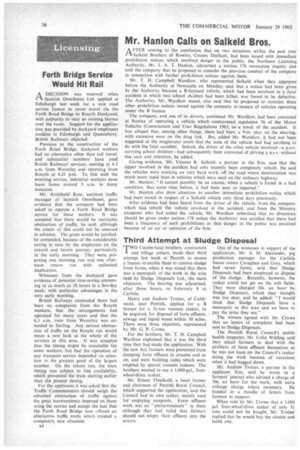Forth Bridge Service Would Hit Rail
Page 38

If you've noticed an error in this article please click here to report it so we can fix it.
A DECISION was reserved when Scottish Omnibuses Ltd. applied at Edinburgh last week for a new road service licence to cover travel via the Forth Road Bridge to Rosyth Dockyard, with authority to vary an existing licence over the route. Support for the application was provided by dockyard employees resident in Edinburgh and Queensferry. British Railways objected.
Previous to the construction of the Forth Road Bridge, dockyard workers had no alternative other than rail travel, and substantial numbers have used British Railways' services, starting at 6.3 a.m. from Waverley and returning from Rosyth at 4.31 p.m. To link with the morning service, industrial workers must leave home around 5 a.m. in many instances.
Mr. Archibald Ross. assistant traffic manager of Scottish Omnibuses, gave evidence that the company had been asked to operate a Forth Road Bridge service for these workers. It was accepted that there would be inevitable abstraction of traffic, he said, although the extent of this could not be assessed in advance. The grant would be justified. he contended, because of the considerable saving in time by the employees on the inward and return journey, particularly in the early morning. They were proposing one morning run and one afternoon return run with unlimited duplication.
Witnesses from the dockyard gave evidence of potential time-saving amounting to as much as 10 hours in a five-day week, with particular advantages in the very early morning.
British Railways contended there had been no complaints from the Rosyth workers, that the arrangements had operated for many years and that the 6.3 a.m, train from Waverley was extended to Stirling. Any serious abstraction of traffic on the Rosyth run would mean a new look at the whole of the services in this area. It was accepted that the timing might be unsuitable for some workers, but that the operation of any transport service depended on attention to the greatest good of the largest number. On the return run, the train timing was subject to line availability, which prevented the train starting earlier than the present timing.
For the applicants it was asked that the Traffic Commissioners should weigh the admitted abstraction of traffic against the great inconvenience imposed on those using the service and accept the tact that the Forth Road Bridge now offered an alternative traffic route which created a completely new situation.
84




















































































































